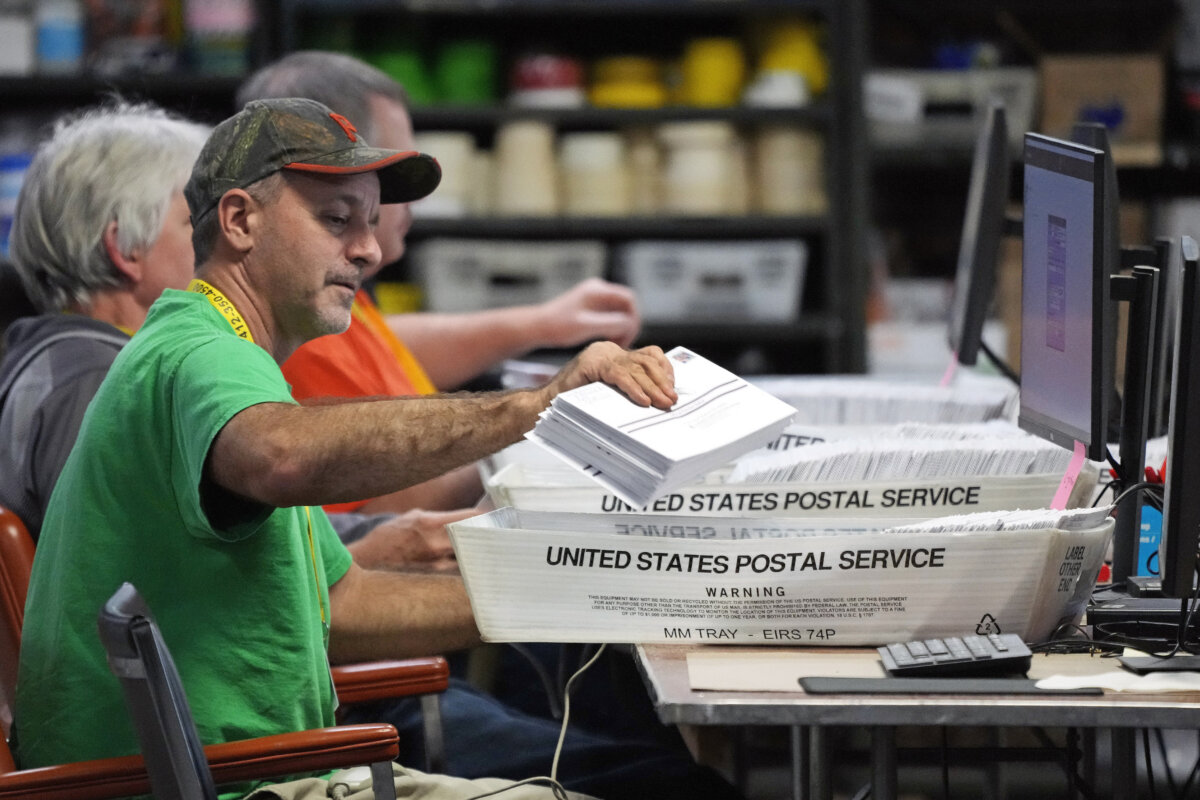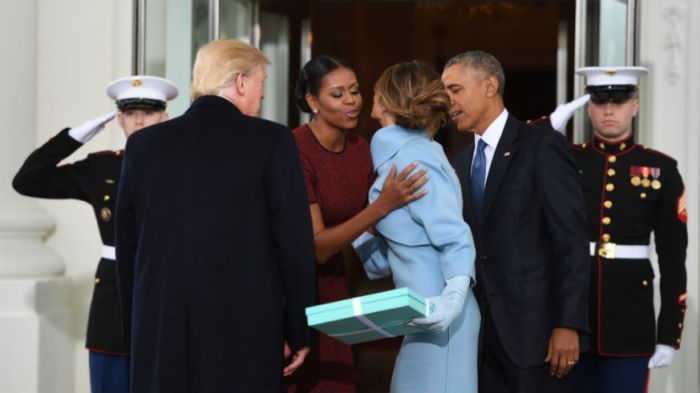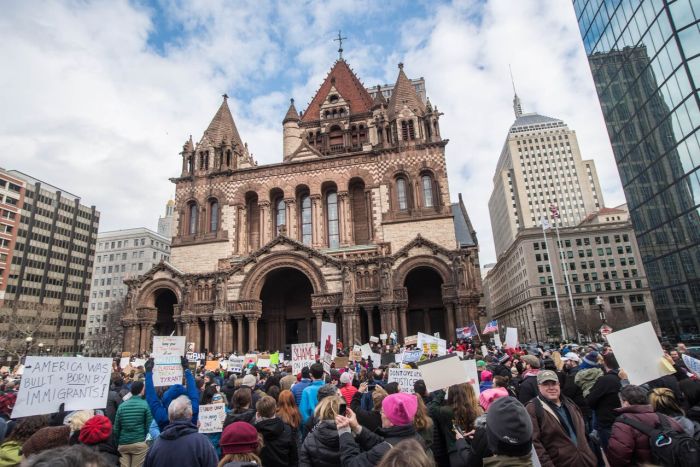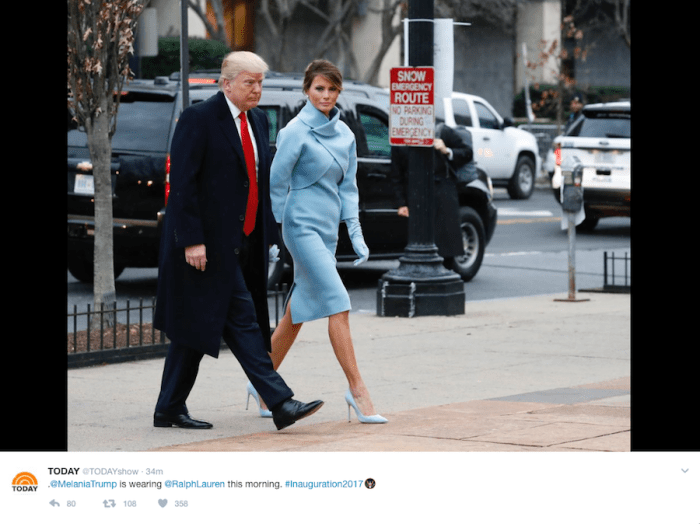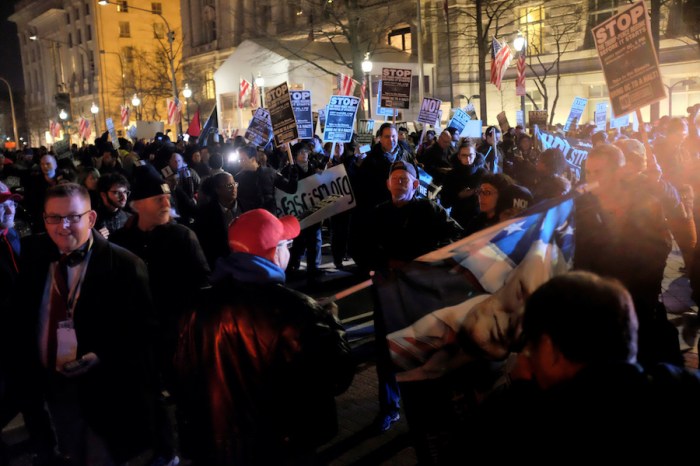Courtney Woods, 23 Why is it worth it to make the trek down to D.C.for this march?
I am a black woman. I’m from a low-income household. I’m the first in my family to graduate from college and the Women’s March for me symbolizes maintaining the Obama legacy. It symbolizes fighting for women’s rights, and that can be anything from reproductive rights to the right to assert yourself and run for office, to not be called nasty [or] be judged within a misogynist lens. More importantly, I think in an odd way this represents for me maintaining the legacy of Michelle Obama in particular. She made her agenda about girls being given the opportunity to be educated and pursue their dreams. What do you hope this march will convey to Trump and his administration?
I hope that it conveys that we’re not going to lose our rights without a fight. We were already trying to fight to advance our rights, now we’re fighting to sustain them. I hope that it tells the whole Republican party that we’re not going to give up on Planned Parenthood. We’re not going to give up on the Affordable Care Act and having access to quality healthcare. We’re not going to give up on a quality education for everyone. And we’re not going to turn our backs while our civil liberties are slowly taken from us. Are you nervous about any rebuke or confrontation? How do you feel ahead of the event?
My only true concern, to be completely honest, is that I’m going in my brown body, and me going in my brown body means that if there’s anyone who does anything slightly improper, I could be attacked by police, could be tear gassed, could be in wrong place at the wrong time. That’s the only concern that I have. I don’t care about people trying to delegitimize the movement; I expect that there’s going to be surveillance, but what I do care about is the authorities that will be maintaining peace during that, that they will respect my life within my brown body. Shawna Wright, 28 Why did you decide to make the trip all the way to Washington?
Initially, I have a friend that lives in D.C. with her husband and we had planned to go down assuming it was going to be Hillary Clinton’s inauguration and I wanted to be there for that. Back in October, it was like, ‘When Hillary wins, can I come stay with you?’ Then Hillary didn’t win. I don’t remember when it was announced that the march was happening, but I said why don’t we come down for this march instead. I am a white, straight, technically upper-middle class woman in Massachusetts. My rock bottom under this administration is not that low compared to a lot of other people. I have employer health care, I have a 401k, I’m not super worried about me — but I have a lot of friends that aren’t straight, white, middle-class women in Massachusetts, and I’m worried about them. I’m worried that this administration is going to do harm to my friends. What is an issue that concerns you the most?
The joke I had with my friends is it feels like everything’s on fire and I only have one bucket of water, so what am I going to be mad about first? For me, I decided the three things I’m going to focus my energy on are protecting Planned Parenthood, protecting federal lands from being sold to the highest bidder — which I realize is not a core component of this march but I like the National Parks and want to keep them— and the third thing was any type of legislation that targets people because of their race, religion, gender orsexuality, like the Muslim registry. What do you hope the message is to Trump, his administration or anyone else supporting him?
Do I think they’ll hear us? Probably not, because they’re living in their own universe right now, but what I hope it says is, ‘you can’t steamroll this.’ You can’t just run amok and not assume that somebody’s going to do something about it. There’s obviously a power change going on right now — it’s a Republican White House and a Republican Senate and a Republican House of Representative. I have to imagine they’re super excited about that because they believe they’ll be able to pass all of the legislation they want, and I want to remind them that there’s a lot of people who are willing to stand up to some of the things they want to do. I think we feel in the wake of this election like, ‘Oh my god, how did we miss this, maybe we are in the minority, maybe we are grossly outnumbered,’ and I don’t think we are.
Marian Knapp, 78 Why did you decide to attend the march?
The main reason is that I feel that Donald Trump is inadequate to be President of the United States and in particular, I am appalled by his statements concerning women. His denigration of women and his wanting to do away with Roe v. Wade which many of us fought for for decades, so that women had a choice about their own bodies. Many people were saying to me, ‘Oh it’s so great that you’re going, I wish I could go but I can’t.’ I had this idea, and said give me your names and I’ll put all the names on a thumb drive and take it with me in a pocket of my coat near my heart. I sent out that message to my website and started getting responses immediately.. My goal is to have 100 people in my heart to take with me — and a lot of these are older people who maybe marched in the ‘60s and can’t do it anymore, so I’m marching for them along with me. Have you been politically involved before?
In 1973, I had young children and as soon as Roe v. Wade [happened], I became a counselor for Planned Parenthood. I was an abortion and reproductive rights counselor on the phone for Planned Parenthood and then I went to work for a clinic and counseled women who had unwanted pregnancies — some as young as 12, 13 years old. I was there during that time, so I saw what women were dealing with. My mother kept telling me, ‘No one has a right to tell a woman what to do with her body.’ I have been in this discussion — not as active as many people, but certainly did what I could — but I was never been able to get to Washington for big marches for civil rights because I had two young kids at home, so I’m taking this opportunity to say who I am and where I come from. Younger people, even middle-aged people, don’t understand what it was like back in the ‘60s and ‘70s when we were all working and thinking how can we improve life for women, improve racial disparities. I come from this long, not so much activism, but certainly thinking and trying to do what I can around these issues. That’s why I’m going. What do you think will be the impact of the march?
I don’t know except to show that we won’t be silenced. That we’re going to stand up. I think we, all of us, are showingthat we’re not afraid and that we’re there and this is our voice.
The effect… we’ll find out. For the people that are going,we now know there are millions and millions of people who feel the same way. We’re not alone, sitting there not knowing what to do. That was one reason I asked people to give me their names, so people who can’t participate know that they’re part of it in some way. Adam Groff, 46 Why are you going down to D.C.?
I just think it’s important to has as many bodies in the street as possible. I think it needs to be made clear that the agenda of the incoming administration is at odds with a really large swath of the American public and a good way to make that apparent is by getting people in the street to show that. One of the things I really like about the way this march is shaping up is that —I mean it’s a women’s march and I completely support that, I think that women’s issues are obviously at the forefront here and they’re significantly under threat by the incoming administration — but I really appreciate the way the leadership of this march has beenintentional about it not being narrowly defined. It’s intersectional, it’s really inclusive. Do you feel you’ll be accepted at the march as a man?
I think the march organizers have been quite clear about the inclusivity of it, it’s always been ‘women and allies.’
I’m going down with my girlfriend and a friend of hers, the three of us are driving down. Me and my girlfriend — I don’t even remember whose idea it was, it was just something that we both wanted to do. Actually it’s really funny because just yesterday, she said something like, ‘Thank you, I really appreciate you wanting to go along with me to this thing,’ and I was like, wait, what are you talking about, I thought it was my idea. I was almost like, no thank you for going with me. What do you hope will be the effect?
I think the practical effect of it will be very small, and people who like to criticize stuff like this, that’s always what they say. The popular protest is a small but important part of the overall effort for social change. Obviously, just getting people into the street is not going to effect change without policy proposals and political organizing and getting candidates elected, but I really think it’s important to have a show of popular sentiment. Parson Hicks, 35 Why are you going to Washington, and why do you think it’s important?
I will be there for the inauguration.I am a Republican, I voted for Donald Trump andI was a Trump alternate delegate this summer in Cleveland, so to me this is the culmination of a lot of hard work and I’m excited to be there. What do you think about the Women’s March and how it may affect the inauguration?
I think that the perception of the amount of attention [on the Women’s March] is really based on maybe which side of the fence you fall on. I really have not heard much. I do volunteer for a couple of organizations that are actually participating in local marches as well as supporting the overall march, and I was a little bit both surprised and intrigued because I couldn’t understand why we we’re choosing to have women’s marches at this very moment, although I was told that they are nonpartisan. But this is America and people have the right to peacefully protest. It probably will be a bit of a distraction but if that’s what Americans want to do, then fine. Why were you surprised that this is happening?
One of the reasons I’m surprised is that I think there are conflicting messages that are happening about this march. I am a feminist, I also volunteer for Big Sisters of Greater Boston, so of course for me the idea of women and women equality, women’s access to opportunity, it’s all very important to me. Our president-elect hasn’t even taken office yet, nothing has happened, so I’m not really sure what we are marching about at this point. I was also surprised, again because assertions have been made at least by the invitations I’ve gotten, that this is a nonpartisan march. But the fact that it’s happening around the inauguration of the 45th president tells me that it’s not at all nonpartisan — there’s supposed to be a very clear message to the incoming administration. And I have a problem with that, because I think unfortunately what I’ve seen too often in the movement and when it comes to supporting women’s rights in general is that we are selective about our outrage and it tends to be more political than about what’s best for women.
Full-time Master’s candidate at Harvard Graduate School of Education studying education policy and management
Cambridge, Massachusetts
Digital Content Manager at a Financial Services Company
Beverly, Massachusetts
Writer, Community Activist for issues that seniors, aging residentsface
Newton, Massachusetts
Content Editor at EBSCO Communications Services
Newburyport, Massachusetts
Works in healthcare finance
Roxbury, Massachusetts










